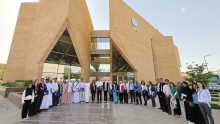 As part of work on tourism for rural development, UNWTO has concluded its first Executive Training for the Middle East Programme. Under the theme ‘Tourism for Rural Development: A Practical Approach to Strategy and Product Development’, the three-day session was held at the UNWTO Regional Office for the Middle East in Riyadh to address the underlying needs for continuous skills development for ensuring up to date learning, adaptation, and innovation.
As part of work on tourism for rural development, UNWTO has concluded its first Executive Training for the Middle East Programme. Under the theme ‘Tourism for Rural Development: A Practical Approach to Strategy and Product Development’, the three-day session was held at the UNWTO Regional Office for the Middle East in Riyadh to address the underlying needs for continuous skills development for ensuring up to date learning, adaptation, and innovation.
Sultan AlMusallam, Deputy Minister for International Affairs, Saudi Ministry of Tourism said: “This training programme demonstrates how determined and keen the Kingdom of Saudi Arabia and UNWTO are to promote the role of the Regional Office for the Middle East, and to provide every support and assistance possible to the Member States of the Organization in the region.”
Opening the programme, Zoritsa Urosevic, UNWTO Executive Director said: “In the post-pandemic world, the role of tourism in rural development is more relevant than ever. Rural tourism has a high potential to empower local communities, stimulate local economic growth and social change.”
“Our Member States see rural tourism as a priority and we trust this training will support them for continuous learning, adaptation, and innovation. It aims to provide them with the adequate knowledge and capacities to plan and manage tourism in rural territories in a way that contributes to inclusive, sustainable, and resilient development,” she added.
The training session was aimed at managers in charge of rural tourism in National Tourism Administrations from across the region. Around 35 participants from 10 countries joined present, representing Egypt, Iraq, Jordan, Lebanon, Oman, Qatar, Saudi Arabia, Syrian Arab Republic, United Arab Emirates, and Yemen.
Sessions focused on issues such as incorporating sustainability dimensions in tourism planning, setting indicators to measure rural tourism strategies, dealing with the specificities of the rural tourism offer and demand, understanding the concept of community engagement through community-based tourism and conducting practical exercises on experiences related to gastronomy, adventure, cultural and ecotourism.
The UNWTO Tourism for Rural Development Programme was designed with the vision of making tourism a driver of rural development and well-being. It aims to advance the role of tourism in valuing and safeguarding rural territories along with their associated landscapes, knowledge systems, natural and cultural diversity, local values, and activities. The Programme also aims to promote innovative and transformative approaches for the development of tourism in rural destinations that contribute to the three pillars of sustainability – economic, social, and environmental – in line with the Sustainable Development Goals (SDGs).
 Tourism Breaking News
Tourism Breaking News


